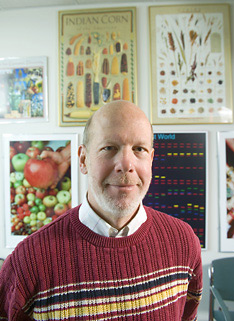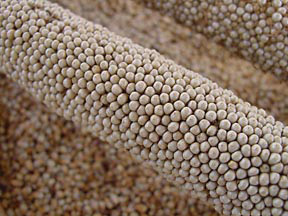Steve Kresovich seeks to improve sub-Saharan staples by focusing on crops' African centers of origin
By Linda McCandless

In his Plant Breeding 404 Crop Evolution class, Cornell plant geneticist Steve Kresovich plays the "F" game: "Look at everything plants provide us: food, feed, fiber, fuel, chemical feedstocks, fragrances and pharmaceuticals," he says.
To which one more must be added: function.
All of which is aimed at advancing human well-being, particularly in sub-Saharan Africa, among the world's most impoverished regions. "What I want to do is understand molecular and population genetics as these disciplines can be applied to effective conservation and use of crops," says Kresovich, Cornell's vice provost for life sciences and a professor of plant breeding and plant biology.
He applies marker-based analyses to understand selection and breeding of grain sorghum and pearl millet, the most important food staples for millions of sub-Saharan Africans.
"It's important to know what is maintained in collections, whether it's in a plant gene bank like the repository in Geneva or in breeders' programs around the world. And then it's critical to establish what is unique in nature so that we can focus to discover new traits. It's an iterative process where we're comparing what is available to breeders and geneticists as contrasted with what is inaccessible," Kresovich says.
Going where the edible grasses grow
He believes that preserving native landraces -- cultivars untouched by modern agriculture -- in their centers of origin for future study and use is essential. "Maybe we won't utilize them immediately, but as the science advances we ultimately will," he says. "At present, the biggest problems are finding and collecting germplasm."

Plant exploration in sub-Saharan Africa, which is the center of origin for crops like grain sorghum and pearl millet, is a challenging business. The climate is severe, the politics are unstable and there are real dangers, such as gangs of militia and land mines in Sudan, where grain sorghum is likely to have originated.
Compared to work on the maize, rice and tomato genome, efforts to unravel the genetic secrets of grain sorghum and pearl millet are not going as rapidly, primarily because far fewer geneticists and breeders focus on these arid-land grain crops, which are not native to the Americas, explains Kresovich. "Research on grain sorghum and pearl millet lags behind, because the areas of Africa where the wild relatives are located are so unstable and the scientific capacity has been limited historically."
Nevertheless, Kresovich is undeterred, working in Mali, Nigeria and Ghana with hopes of fostering closer collaborations with plant breeders in Niger, Burkina Faso, Chad, Sudan and Ethiopia to look for traits that improve yield, nutritional quality, disease resistance and a plant's ability to survive drought.
Kresovich and his team at Cornell's Institute for Genomic Diversity (IGD), which he directs, are compiling genetic maps and databases, making resources available through a centralized Web site, helping train scientists in Africa and developing a longer-term plan for the development of further genetic and genomic resources to improve grain sorghum and pearl millet.
Kresovich earned a Ph.D. in physiology and genetics from Ohio State University in 1982 and then worked as a supervisory geneticist for U.S. Department of Agriculture-Agricultural Research Service Plant Genetics Resources units in Geneva, N.Y., and in Griffin, Ga. He joined the Cornell faculty in 1998 and established the IGD that same year. At any one time, there are more than 20 people in his lab, from Ph.D. students to postdoctoral candidates to visiting scientists and technicians.
But Kresovich has a lot of other priorities, too. In addition to overseeing an active research program in plant breeding in the College of Agriculture and Life Sciences and directing IGD, he heads up the university's New Life Sciences Initiative and is helping oversee construction of the $158 million Life Sciences Technology Building.
To balance it all, he says he is "obsessively compulsive" about shooting hoops and running stadium steps. "It's the best way I know to keep my mind clear and priorities straight," says Kresovich. His well-worn sneakers sit ever ready by his office door. He grins, "Some of my colleagues will tell you it doesn't always work."
From Ithaca to Africa
What does work is how Kresovich conducts basic research on genomic organization and evolution in cereal crops and then applies that scientific understanding to Africa and the semiarid tropics.
"To address the issue of food security in developing countries, we need to support nutritional goals and yield stability and help the farmers produce more, in less-than-optimal environments, so that they get a stable crop they can count on as a source of energy."
To do that, he takes advantage of Cornell's multidisciplinary resources, including scientists at the Boyce Thompson Institute for Plant Research and at the two U.S. Department of Agriculture facilities in Ithaca and Geneva who collaborate on using genomics to unravel plant biochemistry. He also turns to Cornell experts in a host of fields, from evolutionary and population genetics, maize genetics and breeding to cereal pathology.
"Cornell is an international leader in applying comparative genomics to provide solutions to real-world problems," says Kresovich. And one of those problems is improving the staple crops in developing countries to reduce poverty and improve health.
"The FAO [United Nations' Food and Agriculture Organization] and the International Food Policy Research Institute tell us that investment in production agriculture is one of the most efficient ways to reduce poverty and bring benefits directly to poor people," says Kresovich. "Meeting current demands for food as a means of eradicating extreme poverty and hunger, reducing child mortality, improving maternal health, combating disease, ensuring environmental sustainability and developing global partnership for development are specific goals of the [U.N.] Millennium Summit … and priorities at Cornell."
Media Contact
Get Cornell news delivered right to your inbox.
Subscribe